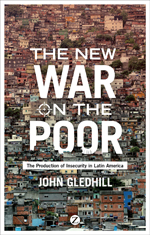The New War on the Poor: The Production of Insecurity in Latin America

This book highlights the author’s decade-long, largely ethnographic research on securitization efforts in the two largest economies in Latin America, Brazil and Mexico. The book reveals how states, with their particular national and local history, and embedded in transnational and global processes, define particular groups of people as threats to society, and what that means for the states’ and citizens’ security.
The author follows Marxist thought and seeks to unpack contradictions of capitalism around questions of security and the underlying logic of a system whose competition for power creates and perpetuates multiple forms of violence. As an anthropologist, he aims to analyze the social situations that shape the roles and perspectives of different actors, such as politicians, the police and citizens.
A significant contribution of this book is the notion that it is tricky to isolate the “harmless” illegal economy from dangerous criminal economies. The author also contends that insecurity is produced by both criminals and state actors, who structurally undermine potentially positive efforts through following “a class-biased logic of securitization; the subordination of considerations of social justice to neoliberal logics of urban development; and failure to embrace fundamental reform of police system” (page 26).
In Chapter 3, Gledhill highlights these points based on ethnographic research in Bahia, Bairro de Paz in Brazil. This explores pacification processes in light of experiences with the police and justice systems, militias and drug traffickers. The nuanced analysis reveals amongst other things how power is expressed along class and racial hierarchies and how the securitization of existing social problems in the neighborhood increases the territory-based stigma of the poor community. At the same time, this securitization undermines potentially positive policies that seek to include residents’ needs and reduce the impact of crime on daily lives.
Chapters 4 and 5 focus on the case of rural Mexico, and several historical moments in which the hegemony of the Institutional Revolutionary Party PRI was forcefully defended, amidst ongoing daily practices of violence and oppression. These moments include the counter-insurgency wars in the state of Guerrero in the 1960s and 70s, the rebellion of the Zapatista Army of National Liberation in 1994 and the “war against drugs” in the state of Michoacán between 2006 and 2012.
Throughout the book, Gledhill argues for:
“reconstructing a public domain ravaged by neoliberal prescriptions, rebalancing the relationship between the public and private, and tackling the structural causes of inequality. Securitization, in all its variants, tends to work in the opposite direction, producing more insecurity for the relatively poor and inconvenient populations that have the most urgent need for the promises of the human security paradigm to be fulfilled.” (page 217)
Further reading:
Environment and Urbanization (2014), “Conflict and violence in 21st century cities”, Vol 26, No 2, available at http://eau.sagepub.com/content/26/2.toc.
Book note prepared by Julia Wesely
Search the Book notes database
Our Book notes database contains details and summaries of all the publications included in Book notes since 1993 - with details on how to obtain/download.
Use the search form above, or visit the Book notes landing page for more options and latest content.
For a searchable database for papers in Environment and Urbanization, go to http://eau.sagepub.com/

